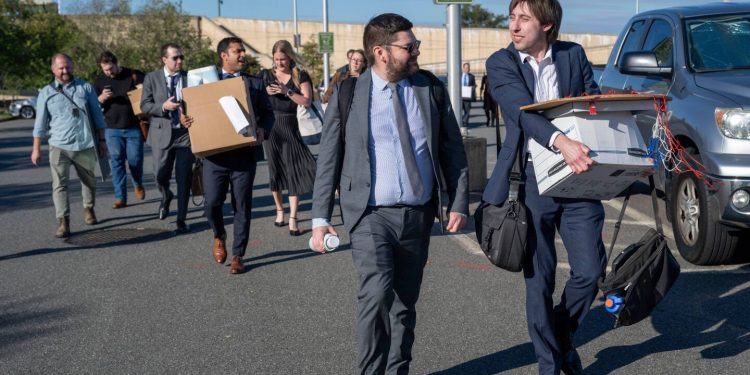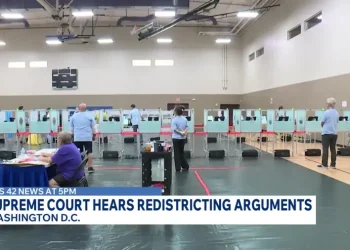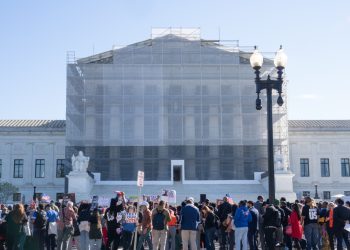NEW YORK (AP) — Dozens of journalists surrendered their access badges and left the Pentagon on Wednesday rather than accept government-imposed measures. restrictions on their workpushing journalists who cover the U.S. military even further from the seat of its power. The country’s leaders called the new rules “common sense” to help regulate a “very disruptive” press.
The media was almost unanimous in rejecting new rules imposed by Defense Secretary Pete Hegseth that would leave journalists vulnerable to expulsion if they sought to report information – classified or not – that had not been approved for publication by Hegseth.
Many journalists waited together at 4 p.m., the deadline set by the Defense Ministry, to exit the building. As the hour approached, boxes of documents lined a Pentagon hallway and journalists carried chairs, a photocopier, books and old photos to the parking lot from suddenly abandoned workspaces. Shortly after 4 p.m., around 40 to 50 journalists left together after handing in their badges.
“It’s sad, but I’m also very proud of the press that we have united,” said Nancy Youssef, a journalist for The Atlantic who has worked at the Pentagon since 2007. She carried a map of the Middle East in her car.
It’s unclear what practical impact the new rules will have, although news organizations have vowed to continue rigorous coverage of the military regardless of viewpoint.
Images of journalists protesting obstacles to their work are unlikely to move supporters of President Donald Trump, many of whom resent journalists and applaud his efforts to make their jobs more difficult. Trump has been involved in legal battles against The New York Times, CBS News, ABC NewsTHE The Wall Street Journal And The Associated Press over the past year.
Trump supports new rules
Speaking to reporters at the White House on Tuesday, Trump supported his defense secretary’s new rules. “I think he finds the press very disruptive in terms of world peace,” Trump said. “The press is very dishonest.”
Even before publishing his new press policy, Hegseth, a former Fox News Channel host, systematically muffled the flow of information. He held only two formal press briefings, barred journalists from unescorted access to many parts of the sprawling Pentagon and launched investigations into media leaks.
He called his new rules “common sense” and said requiring journalists to sign a document outlining the rules means they recognize the new rules, but not necessarily accept them. Journalists see this as a distinction without a difference.
“What they’re really doing is they want to give information to the reporter, and that would be their story. That’s not journalism,” Jack Keane, a retired U.S. Army general and Fox News analyst, said on Hegseth’s former network.
When he was in office, Keane said he asked new brigadier generals to take a course on the role of the media in a democracy so that they would not be intimidated and would also view journalists as a conduit to the American public. “There were times when stories were made that made me flinch a little,” he said. “But it’s usually because we did something that wasn’t as good as we should have done.”
Youssef said it made no sense to register rules That said, journalists should not seek information from military officials. “Agreeing not to solicit information is agreeing not to be a journalist,” she said. “Our goal is to solicit information.”
Reporting on US military affairs will continue – at a greater distance
Several journalists posted on social media when they returned their press badges.
“It’s a very small thing, but I was really proud to see my photo on the Pentagon Correspondents’ Wall,” wrote Heather Mongilio, a reporter for USNINews, which covers the Navy. “Today, I’m handing in my badge. The reporting will continue.”
Mongilio, Youssef and others stressed that they will continue to do their jobs regardless of where their office is located. Some sources will continue to talk with them, even if they say that some military personnel have been cooled by the threats from Pentagon leaders.
In an essay, NPR reporter Tom Bowman highlighted the many times he was briefed about what was happening by people he knew at the Pentagon and while embedded in the military, even though it contradicted official lines issued by leaders. Many understand the role of the media.
“They knew that the American public deserved to know what was happening,” Bowman wrote. “In the absence of journalists capable of asking questions, it appears that Pentagon leaders will continue to rely on slick social media posts, carefully orchestrated short videos, and interviews with partisan commentators and podcasters. No one should think that this is enough.”
The Pentagon Press Association, whose 101 members represent 56 media outlets, has spoken out against these rules. Organizations across media outlets, from traditional ones like the Associated Press and the New York Times to outlets like Fox and the conservative Newsmax, have asked their journalists to leave instead of signing the new rules.
Only the conservative One America News Network signed up. Her leadership likely believes it will have better access to Trump administration officials by showing support, Gabrielle Cuccia, a former Pentagon reporter who was fired by OANN earlier this year for writing an online column criticizing Hegseth’s media policies, told the AP in an interview.
___
Associated Press reporter Laurie Kellman in London contributed to this report. David Bauder writes for the AP about the intersection of media and entertainment. Follow him at http://x.com/dbauder And https://bsky.app/profile/dbauder.bsky.social









